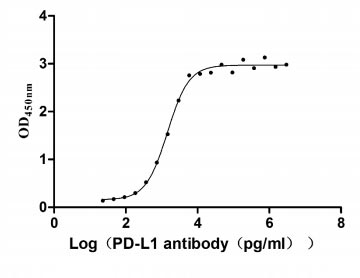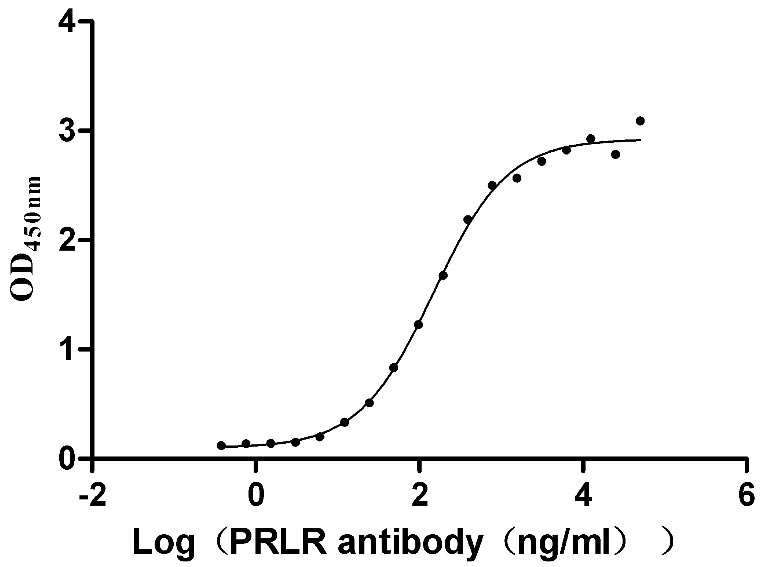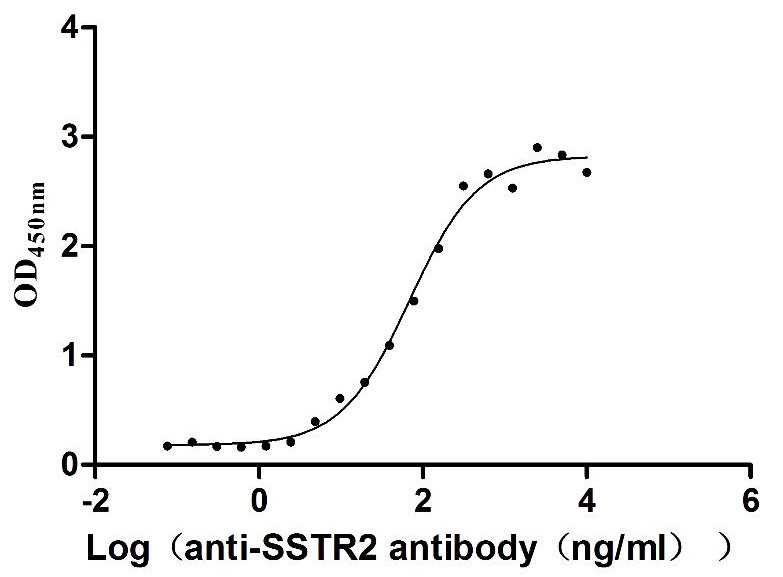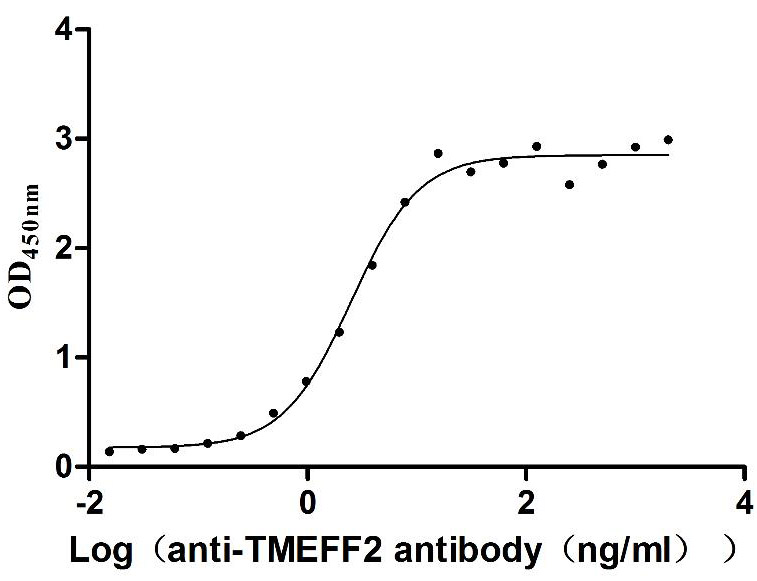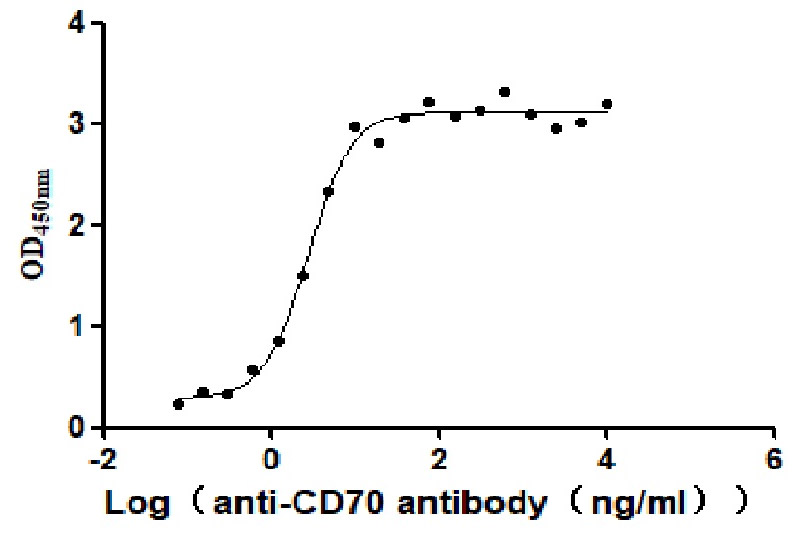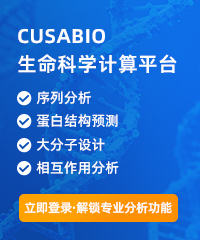Recombinant Human Pappalysin-2 (PAPPA2), partial
-
中文名稱:人PAPPA2重組蛋白
-
貨號(hào):CSB-YP871602HU
-
規(guī)格:
-
來源:Yeast
-
其他:
-
中文名稱:人PAPPA2重組蛋白
-
貨號(hào):CSB-EP871602HU
-
規(guī)格:
-
來源:E.coli
-
其他:
-
中文名稱:人PAPPA2重組蛋白
-
貨號(hào):CSB-EP871602HU-B
-
規(guī)格:
-
來源:E.coli
-
共軛:Avi-tag Biotinylated
E. coli biotin ligase (BirA) is highly specific in covalently attaching biotin to the 15 amino acid AviTag peptide. This recombinant protein was biotinylated in vivo by AviTag-BirA technology, which method is BriA catalyzes amide linkage between the biotin and the specific lysine of the AviTag.
-
其他:
-
中文名稱:人PAPPA2重組蛋白
-
貨號(hào):CSB-BP871602HU
-
規(guī)格:
-
來源:Baculovirus
-
其他:
-
中文名稱:人PAPPA2重組蛋白
-
貨號(hào):CSB-MP871602HU
-
規(guī)格:
-
來源:Mammalian cell
-
其他:
產(chǎn)品詳情
-
純度:>85% (SDS-PAGE)
-
基因名:PAPPA2
-
Uniprot No.:
-
別名:PAPPA 2; PAPP E ; PAPP-A2; PAPP-E; PAPP2_HUMAN; PAPPA2; Pappalysin 2 ; Pappalysin-2; PLAC3; Pregnancy associated plasma protein A2; Pregnancy associated plasma protein E1; Pregnancy-associated plasma protein A2; Pregnancy-associated plasma protein E1
-
種屬:Homo sapiens (Human)
-
蛋白長度:Partial
-
蛋白標(biāo)簽:Tag?type?will?be?determined?during?the?manufacturing?process.
The tag type will be determined during production process. If you have specified tag type, please tell us and we will develop the specified tag preferentially. -
產(chǎn)品提供形式:Lyophilized powder
Note: We will preferentially ship the format that we have in stock, however, if you have any special requirement for the format, please remark your requirement when placing the order, we will prepare according to your demand. -
復(fù)溶:We recommend that this vial be briefly centrifuged prior to opening to bring the contents to the bottom. Please reconstitute protein in deionized sterile water to a concentration of 0.1-1.0 mg/mL.We recommend to add 5-50% of glycerol (final concentration) and aliquot for long-term storage at -20℃/-80℃. Our default final concentration of glycerol is 50%. Customers could use it as reference.
-
儲(chǔ)存條件:Store at -20°C/-80°C upon receipt, aliquoting is necessary for mutiple use. Avoid repeated freeze-thaw cycles.
-
保質(zhì)期:The shelf life is related to many factors, storage state, buffer ingredients, storage temperature and the stability of the protein itself.
Generally, the shelf life of liquid form is 6 months at -20°C/-80°C. The shelf life of lyophilized form is 12 months at -20°C/-80°C. -
貨期:Delivery time may differ from different purchasing way or location, please kindly consult your local distributors for specific delivery time.Note: All of our proteins are default shipped with normal blue ice packs, if you request to ship with dry ice, please communicate with us in advance and extra fees will be charged.
-
注意事項(xiàng):Repeated freezing and thawing is not recommended. Store working aliquots at 4°C for up to one week.
-
Datasheet :Please contact us to get it.
相關(guān)產(chǎn)品
靶點(diǎn)詳情
-
功能:Metalloproteinase which specifically cleaves insulin-like growth factor binding protein (IGFBP)-5 at the '163-Ser-|-Lys-164' bond. Shows limited proteolysis toward IGFBP-3.
-
基因功能參考文獻(xiàn):
- PAPP-A2 mutation is associated with idiopathic short stature. PMID: 29653372
- The findings suggest a possible pathophysiological link between the development of Fetal growth restriction and the expression of PAPPA, PAPPA2 and PLAC-1. PMID: 29532882
- Pregnancy associated plasma protein-A (PAPP-A) appears to be a potentially useful biomarker for short-term risk stratification of patients presenting with chest pain of ischemic origin (Review). PMID: 29144175
- PAPP-A2 is increased in Hemodialysis patients and interacts with PAPP-A on patients prognosis. PMID: 28854436
- This review evaluates the current data concerning PAPP-A2 function, and particularly the effect of PAPP-A2 mutation on growth. PMID: 29238946
- These patients provide important insights into the regulation of longitudinal growth in humans, documenting the critical role of PAPP-A2 in releasing IGF-I from its binding proteins. PMID: 26902202
- Short-term treatment with progressive doses of rhIGF1 (recombinant human insulin-like growth factor-1) improved growth in two siblings with deficiency of PAPP-A2 (pregnancy-associated plasma protein-A2) [due to a homozygous loss-of-function frameshift mutation in exon 3 of the PAPP-A2 gene (p.D643fs25*)] that resulted in postnatal growth failure due to resulting decrease in IGF1 bioavailability. [CASE REPORT] PMID: 27648969
- in situ hybridization (ISH) and immunohistochemistry (IHC) were employed to examine the spatial and temporal expression of PAPPA2 in the human fetomaternal interface. PMID: 27525857
- PAPP-A2 is differentially expressed in different trophoblast populations and shows strong down regulation in the mid second trimester in chorionic villous samples. PMID: 26748159
- overexpression in Down syndrome from placental mRNA to maternal serum protein PMID: 25154785
- The association between this PAPPA2 single nucleotide polymorphism and developmental dysplasia of the hip was evaluated. PMID: 24672801
- The upregulation of PAPP-A2 observed in preeclampsia at term occurs early in pregnancy, before the symptoms develop. PMID: 24336677
- PAPPA2 may be upregulated in severe pre-eclampsia and, functionally, this may be mediated via increased placental hypoxia known to occur with this pregnancy disorder. PMID: 23484525
- The existence of this assay will enable an assessment of the biomarker potential of PAPP-A2 in pre-eclampsia as well as other clinical conditions. PMID: 23804707
- Association of a single nucleotide polymorphism in pregnancy-associated plasma protein-A2 with developmental dysplasia of the hip PMID: 22037112
- factors previously known to be highly expressed in preeclamptic placentae (PGE2 and TNF-alpha), contribute to the upregulation of PAPPA2. results are consistent with the hypothesis that PAPPA2 is upregulated as a consequence of placental pathology PMID: 21496272
- Circulating IGFBP-5 is proteolyzed by PAPP-A2 during pregnancy, resulting in increased IGF bioavailability, which may have important consequences for the development of the fetus and/or the well-being of the mother. PMID: 20103653
- Seven placental transcripts characterize HELLP-syndrome. PMID: 18374411
- PAPP-A2 in syncytiotrophoblast cells was dramatically increased in pre-eclampsia. Maternal serum concentrations of PAPP-A2 were also significantly elevated in pre-eclampsia as compared with uncomplicated pregnancy. PMID: 18805800
- Preeclampsia involves changes in the gene expression of PAPPA2 in placental cytotrophoblasts. PMID: 18818296
- PAPPA2 is expressed in the syncytiotrophoblast layer of human placental villi and is also detected in some invasive extravillous trophoblasts in the first trimester PMID: 19474058
顯示更多
收起更多
-
亞細(xì)胞定位:Secreted.
-
蛋白家族:Peptidase M43B family
-
組織特異性:Expressed abundantly in placenta, and non-pregnant mammary gland with low expression in the kidney, fetal brain and pancreas.
-
數(shù)據(jù)庫鏈接:
Most popular with customers
-
Recombinant Human Programmed cell death 1 ligand 1 (CD274), partial (Active)
Express system: Mammalian cell
Species: Homo sapiens (Human)
-
Recombinant Human Prolactin receptor (PRLR), partial (Active)
Express system: Mammalian cell
Species: Homo sapiens (Human)
-
Recombinant Human Somatostatin receptor type 2 (SSTR2)-VLPs (Active)
Express system: Mammalian cell
Species: Homo sapiens (Human)
-
Recombinant Human Tomoregulin-2 (TMEFF2), partial (Active)
Express system: Mammalian cell
Species: Homo sapiens (Human)
-
Recombinant Human CD70 antigen (CD70), partial (Active)
Express system: Mammalian cell
Species: Homo sapiens (Human)
-
Recombinant Macaca fascicularis Cadherin 6(CDH6),partial (Active)
Express system: Mammalian cell
Species: Macaca fascicularis (Crab-eating macaque) (Cynomolgus monkey)


